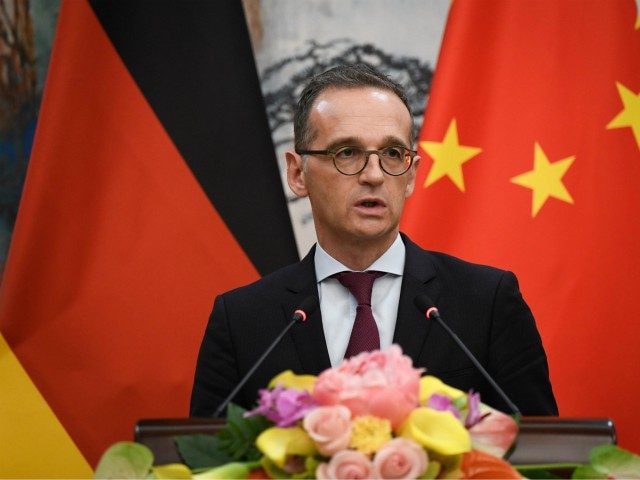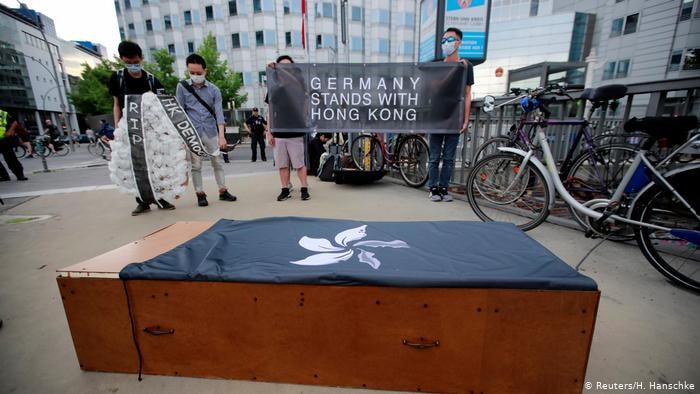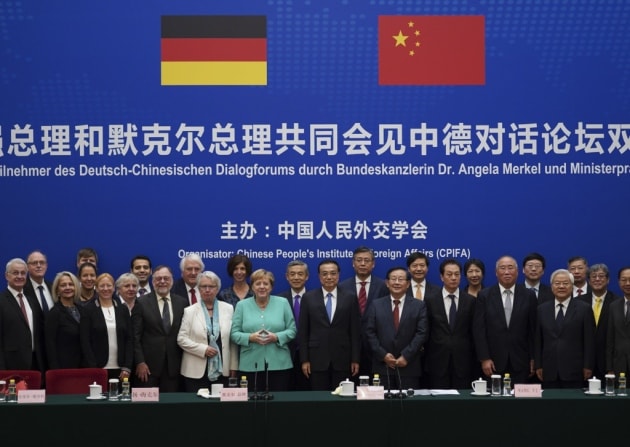Germany 'tough' with China: Confrontation or just 'wind blow'?
(Baonghean.vn) - Germany is the next Western country to suspend its extradition treaty with Hong Kong (China) in connection with the election in this special administrative region.
This is a rare response from Berlin to China’s problems, in the context of other Western countries, especially the US and UK, constantly criticizing Beijing for its lack of transparency about the origin of Covid-19 and more recently its move to impose a new security law in Hong Kong. So how can we explain this behavior of Germany?
Western effect
In a notable statement, German Foreign Minister Heiko Maas announced on July 31 that he would suspend the extradition treaty with Hong Kong, citing the Hong Kong government's declaration that many opposition candidates were ineligible to run for office and the decision to postpone the September election. Germany thus became the first EU country to announce the suspension of the extradition treaty with Hong Kong. This can be considered Berlin's first "strong" reaction after a period of cautiousness in the face of criticism from other Western countries aimed at Beijing regarding the origin of the SARS-CoV-2 virus and the Hong Kong security law. There are three possible reasons for Germany's reaction this time.
 |
| German Foreign Minister Heiko Maas announced on July 31 the decision to suspend the extradition treaty with Hong Kong. Photo: Reuters |
First of all, Germany is holding the rotating presidency of the EU, so any decision could be a “mirror” reflecting the EU’s perspective. Meanwhile, the EU has repeatedly expressed deep concern about the Hong Kong security law that China passed at the end of June, saying that this new law will seriously affect the special administrative region’s long-standing autonomy and relative freedom.
The EU has even recently decided to restrict the sale of “dual-use” technology to Hong Kong, which is technology that can be used for civilian purposes but can also be used for military and security operations, such as positioning systems, thermal imaging glasses or crowd control equipment. They believe that these are technologies that can be used for “internal repression, internal communications eavesdropping or cyber surveillance”. In such a context, no matter how cautious Germany is, it is forced to have a certain response to China to ensure a unified stance within the EU.
Second, similar to the EU itself, Germany can hardly stand aside without making any moves when other allies such as the US, UK, and Canada are all “boiling” over China’s policies. Although the Berlin-Washington relationship has shown signs of “cracking”, Chancellor Angela Merkel’s government can hardly choose to lean towards China and ignore the US. So, at least, the “Western effect” forces Germany to speak out against China’s actions, even if this angers Beijing.
Third, there is also a growing sense within Germany that the government should change its stance on China. Politicians from both the opposition and the government are accusing Chancellor Merkel of being too soft on Beijing. Didi Kirsten Tatlow, a senior fellow at the German Council on Foreign Relations (DGAP), told DW that in its efforts to maintain relations with Beijing, Germany is being too “soft” and that this could cause “disappointment” among Hong Kongers. And this may also put pressure on Berlin to respond to Beijing.
 |
| China condemns Germany's decision to suspend extradition treaty with Hong Kong. Photo: Reuters |
Many benefits attached
However, many experts believe that Germany will find it difficult to go further in confronting China. Like most other European countries, Germany is basically not interested in pursuing the same approach as the US, that is, confronting China. Many German politicians believe that Europe in general and Germany need to create a "separate position" when the US and China are increasingly tense and wars are not excluded.
It can be seen that over the years, German officials have always treated China skillfully. Since the time of Chancellor Helmut Kohl, German officials have become regular guests of Beijing. During her 15 years as Chancellor, Angela Merkel made 12 trips to China. She was accompanied by a series of CEOs from major German companies with the aim of both introducing them to Chinese leaders and emphasizing Germany's unique advantage in the manufacturing sector.
Names like Bosch, BMW, Mercedes, Siemens and Volkswagen are all major manufacturing brands, supplying factory equipment and infrastructure that helped China become the world's leading manufacturer. In turn, working with Asia's fastest-growing economy has also helped Germany recover strongly from the financial crisis and overcome the European sovereign debt crisis.
Moreover, the German motto on China has always been “Wandel durch Handel,” which means “change through trade.” Germans love to spend on humanitarian and commercial causes, hoping that by giving everyone a global order and freedom, positive changes can be achieved. “Germany-China trade relations dominate more than security issues,” says Noah Barkin, a research fellow at the German Marshall Fund in Berlin. In fact, since 2017, China has replaced the United States as Germany’s largest trading partner, and bilateral trade volume surpassed $200 billion in 2018.
 |
| German Chancellor Angela Merkel (center left) and Chinese Premier Li Keqiang (center right) pose for a group photo during the Germany-China Dialogue Forum in Beijing on September 6, 2019. Photo: AFP |
In a notable development, right after Germany agreed to spend 10 billion USD to rescue Lufthansa in June 2020, the airline announced the resumption of its Frankfurt - Shanghai route. Observers said that, whether coincidental or calculated, Lufthansa's new move showed that Germany prioritized restoring trade links with China, which were disrupted due to the Covid-19 pandemic.
With such close trade and business ties, it is understandable that the German government would want to avoid confrontation with the Chinese government. So Germany’s latest tough decision on the Chinese territory of Hong Kong can be seen as just a “high-handed strike” in an inevitable context. In the long term, even when Chancellor Merkel leaves office, there is no certainty that Germany will completely change its stance on China, as economic and trade cooperation remain Berlin’s priority.

